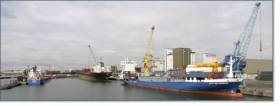Displaying items by tag: EU Agree TEN T
IMDO Review: Big Response to Dublin Bay Dumping, EU Agree TEN-T, UK Concerns on Brexit & More
#IMDOreview - The Irish Maritime Development Office (IMDO) latest Weekly Market Review has among the following stories below.
Irish Maritime News: The Environmental Protection Agency (EPA) received a record number of submissions in relation to Dublin Port's Dumping Plan as reported on Afloat.ie following the port's most recent application to dump spoil in Dublin Bay.
Global Maritime News: E.U Ministers Agree to Implement TEN-T - The EU transport ministers convened at the first day of the TEN-T Days in the Van Nelle Factory in Rotterdam on Tuesday of this week.They discussed the process of implementing the Trans-European Transport Network: new challenges and opportunities, new technologies and mobility patterns for passengers, as well as digitalization and automation of freight transport.
Leaders of the U.K Shipping Industry Concerned with Brexit - Members of the U.K.’s shipping community are concerned about the future of London’s role as a global centre of ship financing, brokering and insurance in the case of a British exit from the European Union.
Although the U.K. has long lost its status as the world’s top ship-owning nation, the maritime business contributes an annual $6.5 billion to the economy, with some 80% of business from abroad, according to PricewaterhouseCoopers.
For more on the above stories and other news items, click here and Afloat.ie's Ports & Shipping news here.





























































